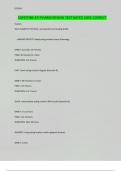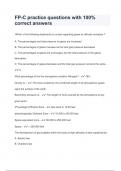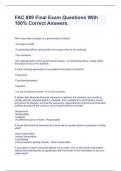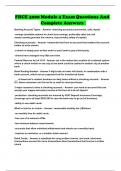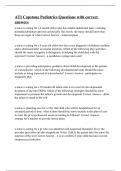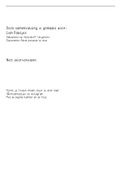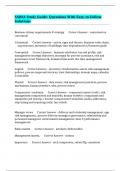“The main reason Henry VII succeed in establishing the dynasty was due to the strength of his
royal connections”
Agree Disagree
Descended from Edward III Control of the nobility
• His mother, Margaret Beaufort, was a direct • Henry aimed to reduce the size of the nobility
descendant of Edward III by the marriage of his (only made one Earl in his reign whereas Edward
third son, John of Gaunt, Duke of Lancaster to IV made 9).
Katherine Swynford. • The peerage shrunk from 57 nobles to 44.
• The Marquess of Dorset was made to sign bonds
COUNTER-ARGUMENT for £10,000 to ensure his loyalty after he was
• The fact that his claim came through his mother implicated in the Simnel plot. When Henry
made it weak. invaded France in 1492, Henry took the
• John and Katherines son, John Beaufort, had Marquess’ son with him as hostage to ensure he
been born prior to their marriage which weakened didn’t do anything whilst Henry was abroad.
any future claim to the throne by this line of • Henry VII passed laws against retaining in 1487
descent. and 1504. Nobles had to have a licence to keep
armed men and had to prove that they were only
to be used on the Kings behalf.
• In 1506 Lord Burgavenny was fined £5 a month
per illegal retainer - it came to a bill of over
£70,000.
Henry VII was the half nephew of Henry VI Victory in battle
• Henry inherited royal blood from his father, • The fact that he defeated and killed King Richard
Edmund Tudor. III was regarded as a sign that God had approved
• Edmund’s French mother, Catherine, had been of Henry’s assumption of power.
married to Henry V before she became the wife of • Henry had support from power people e.g. the
Edmund’s Welsh father, Owen. Stanley family - had a private army of around
• Edmund was the half brother of the king, Henry 6000 men.
VI. • He sailed from France with around 2000 men and
• Henry VI raised his half brother to the peerage by by the time he reached the battle field he had up
creating Edmund, Earl of Richmond. to 5000 men.
• Therefore, Henry VII was the half-nephew of the • Richard was killed on the Battlefield and Henry
king of England and a member of the extended was crowned king.
royal family.
“Henry VII’s financial policies made the most important contribution to his success as a ruler”
Introduction
• Henry VII was able to develop a England from being financially ruined, isolated and a divided country
after the War of the Roses, into a financially stable and united country that sat comfortably within its
European peers.
• Henry was successful in increasing the crowns finances, which is shown by the fact that he had left
£300,000 for Henry VIII at the end of his reign.
• However, Henry’s success as a ruler was not just due to the increase in finances, but also his successful
consolidation of power and foreign policy, and it would be wrong to oversimplify his success down to
his financial policies.
Agree Disagree
, Extraordinary revenue Foreign policy
- Revenue that came from the duty of his subjects • Medina del Campo 1489 - secured the marriage
of the king to help him in times of need. between Catherine of Aragon and Arthur, agreed
- Parliamentary grants - taxes were used for Battle not to harbour pretenders and not to ally with
of Stoke in 1487, to go to with with France in France, and set up equal trading rights for
1496 and to defend against the Scots and Perkin merchants from both countries and fixed custom
Warbeck. duties, which tended to favour the English
merchants.
COUNTER-ARGUMENT • Truce of Ayton 1497 - James IV of Scotland didn’t
• Led to rebellion - Yorkshire rebellion (tax to assist take advantage of England’s weakness during the
Brittany in 1489) and Cornish rebellion (campaign Cornish Rebellion and impersonation of Warbeck,
in Scotland). so signed a peace treaty. There had been no
• In these situations the full amounts were not similar agreement between countries since 1328.
raised due to the rebellion e.g. only £27,000 out of
the £100,000 granted due to Yorkshire Rebellion.
Ordinary revenue Consolidation of power
• Money gained from outside parliament that came • Dated his reign back to 21 August 1485 before
in annually. the Battle of Bosworth to justify accusing those
• Crown lands income increased from £29,000 in who fought against him of treason.
1485 to £42,000 in 1509. First Parliament - Act of • Coronated on 30 October 1485 in London before
Resumption - took lands for the crown taken marriage to Elizabeth and first Parliament to make
since 1455. his reign seem more legitimate.
• Feudal dues - paid by people who held land from • Marriage to Elizabeth reduced Yorkist threat.
the king but wished to avoid military service.
Funds increased from £450 in 1487 to £6000 in
1507.
Conclusion
• Henry’s financial policy did contribute to his ability to sustain the throne, leading to a succession rule.
• However it was not the most successful reason for success as it did lead to rebellion, and other factors
such as consolidation and foreign policies enabled Henry to establish a successful rule early on in his
reign.
“Despite the need to secure his dynasty, it was the desire to expand England’s overseas trade
that underpinned Henry VIII’s foreign policy”
Introduction
• Overseas trade was important due to the positive impact it had on the English economy.
• However, it was less significant than Henry’s want to secure the dynasty and stop pretenders.
Agree Disagree
Overseas trade Secure dynasty through marriage
• 1489 Treaty of Medina del Campo allowed equal • Treaty of Medina Del Campo (1489) Arthur and
trading rights for merchants between Spain and Catherine of Aragon.
England and fixed customs duties at a rate that • Treaty of Ayton (1502) James IV of Scotland and
proved favourable for English merchants. Margaret Tudor.
• Maintaining the cloth trade with Burgundy also • These marriages helped secure the succession
remained a high priority, and the most significant because the Spanish and Scottish royal families
set he made towards this was the Intercursus had a personal connection with the Tudor
Magnus agreement (1496). dynasty.
• The Navigation Acts (1485-86) were passed in • It shows Henry had been accepted internationally
attempt to promote and protect English trade and as the rightful king of England, thus consolidating
thereby break the monopoly enjoyed by the authority.
German Hanseatic League.

